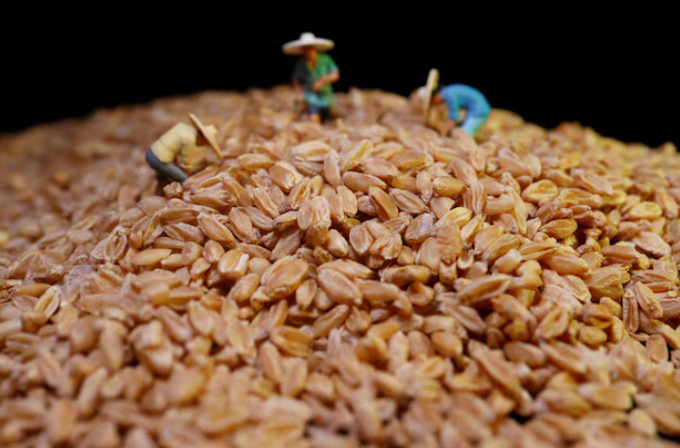November 26, 2025 | 20:36 GMT +7
November 26, 2025 | 20:36 GMT +7
Hotline: 0913.378.918
November 26, 2025 | 20:36 GMT +7
Hotline: 0913.378.918

Wheat kernels are displayed with farmer miniatures in this illustration picture taken June 20, 2023. Photo: Purchase Licensing Rights.
China has in the past year ramped up approvals of genetically modified (GM) corn and soybean seeds that are higher-yielding and resistant to insects and herbicide to secure its food security, but the uptake remains slow and cautious due to concerns about the impact to health and ecology.
Unlike genetic modification, which introduces foreign genes into a plant, gene editing alters existing genes to change or improve its performance and is viewed by some scientists as less risky than genetically modifying them.
China mostly imports GM crops such as corn and soybeans for animal feed and grows non-GM varieties for food consumption. Many Chinese consumers remain concerned about the safety of GM food crops.
The approval for the gene-edited disease-resistant wheat is seen as a milestone, as the ingredient - used to make pasta, noodles and bread - is predominantly grown in China for food consumption. China is the world's largest wheat producer and consumer.
"It is a big step, we can see the light for China to open up approvals for other food crops," said a seed industry executive.
Beijing is also expected to pass new rules this year for the labelling of genetically modified crops used in food products, state media reported in March.
The agriculture ministry on Wednesday also approved a new variety of genetically modified corn with herbicide and insect-resistant traits, as well as one gene-edited corn variety that is higher yielding.
The GM corn approval includes a variety by Origin Agritech (SEED.O), opens new tab.
The safety certificates have been approved for five years from May 5, according to a document published by the Ministry of Agriculture and Rural Affairs.
The world's biggest buyer of soybeans and corn aims to raise domestic production through higher yielding seeds and cut its grains imports of more than 100 million metric tons a year.
(Reuters)

(VAN) A new study reveals how the simultaneous effects of ocean acidification, salinity and loss of oxygen are making the world more fragile.

(VAN) Hopes are growing that the creation of the first 3D turkey gut model could be a turning point in the battle against the virulent blackhead disease.

(VAN) Tyson, America’s biggest meat supplier, plans to shutter one of its largest beef processing plants as the industry continues to struggle with low cattle supplies and political pressure from Washington.

(VAN) New FAO study shows how digital solutions are empowering farmers and fishers to prevent losses and build resilient agrifood systems.

(VAN) Brazil's COP30 presidency pushed through a compromise climate deal on Saturday that would boost finance for poor nations coping with global warming but that omitted any mention of the fossil fuels driving it.

(VAN) Poultry farmers in the UK have been warned that they could face one of the worst winters yet for bird flu.

(VAN) Prices of main-crop paddy have risen sharply, with jasmine rice hitting 16,100 baht per tonne — the highest level in years.